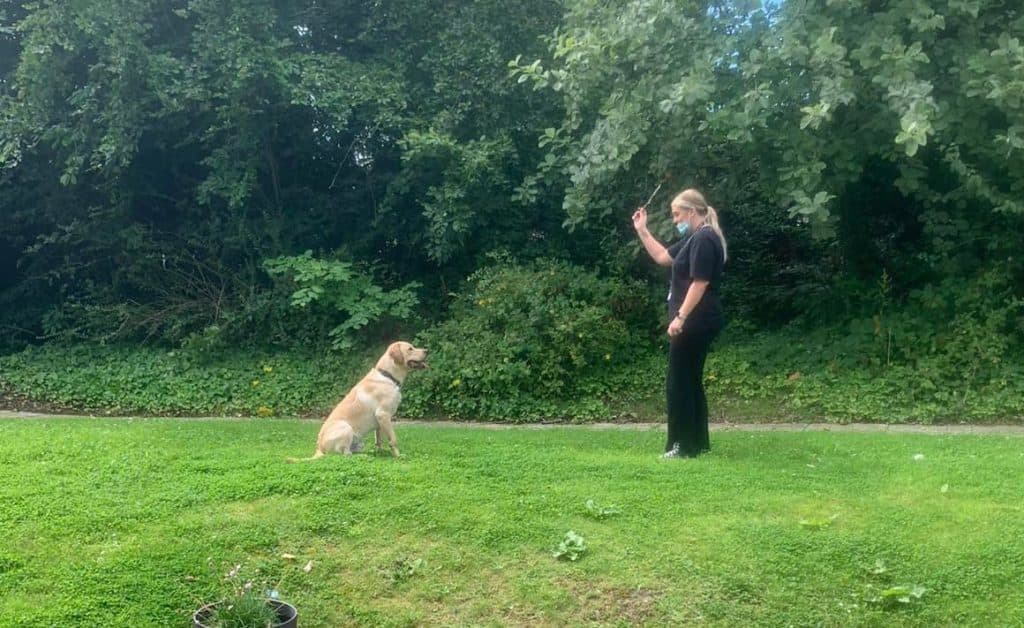

Like so many care homes in the UK, Rubislaw Care Home understands and appreciates the importance of animal and pet therapy in care homes. The positive effects of regular animal interaction affect individuals both physically and mentally. In this blog we discuss what animal therapy is and the benefits animal visits to nursing homes can bring residents.
Also referred to as Pet Therapy, Animal Therapy is offered in a range of settings, including retirement living, community care, residential care, nursing homes, hospices and rehabilitation centres. Animals used for this recognised therapy can range from domesticated pets to farm animals.
Research suggests that animals have the ability to boost general health and wellbeing. Pet or animal therapy is a type of therapy that uses various animals as a form of companionship and treatment for people of all ages with the aim of improving emotional, social and/or cognitive abilities.
Animal Therapy in care homes offer residents affection, enjoyment and entertainment. Those who are given the opportunity to spend time with animals, are given something to look forward to, companionship and a conversation starter amongst fellow residents. Other benefits also include:
Feeling isolated from family members and having a lack of motivation or sense of purpose can be a familiar feeling among residents within a care home, and as stated by petsastherapy.org a friendly animal visit “is a chance for residents to chat and reminisce about past experiences or much-loved pets”. Animals and humans have existed in therapeutic relationships with each other for more than 12,000 years. The natural healing that comes from interacting with animals continues to be hugely beneficial for a wide variety of individuals, especially those living in a care home, and can help increase mood, motivation, self-esteem, and physical and psychological well-being.
According to Michele L. Morrison who wrote the Sage publication “Health Benefits of Animal-Assisted Interventions”, says, “Dogs are the most common type of animal used in Pet Therapy, but a variety of animals can be used for beneficial health effects.” The Delta Society has identified the following as some of the animals that can be considered for use in Pet Therapy:
The benefits of pet therapy for people living with Dementia often include being able to relive and enjoy happy memories of previous pets and is a positive way of unlocking memories for residents who are suffering from Dementia and Alzheimers.
Alzheimers.net says: “While companionship is an obvious benefit, a well-timed pet visit may also help with anxiety and depression. It’s not uncommon to watch someone transition from emotionless to joyful when a pet enters the room, especially if it triggers pleasant memories.”
Animal visits can be energetic, positive and leave a lasting experience with those with Dementia. https://www.alzheimers.org.uk/ states that “animal-assisted interventions can often improve self-esteem and confidence in people with dementia. It can also promote quality of life and encourage independence.”
As care specialists we know the positive effects pet therapy in nursing homes can have. With our wide array of facilities and activities, we’re able to create a care home in Aberdeen where residents feel loved, safe, and excited for the day ahead. One of our most recent additions to the home has been a beautiful dog. We introduced a beautiful four-legged furry friend into the home almost a year ago and Brodie, a gorgeous Labrador, has already made such a wonderful impact. Home Manager Gayle commented:
“The positive effects a pet can bring into the home are extensive, from providing companionship to affection, and can often bring back happy memories of previous pets or times with family and friends. This is a positive way of unlocking memories for residents who are suffering from Dementia and Alzheimers. One thing for sure is that Brodie is never going to be short of love and affection from everyone at the home.”
We pride ourselves on creating a home from home environment at Rubislaw Park and regularly seek input from our residents as to what they would like. Both residents and staff alike thoroughly enjoy quality time with Brodie and he has already proven to be a wonderful addition to the Rubislaw family.

We are thrilled to be able to offer residents a motivating and accessible Activity Programme that allows all residents to partake and enjoy. We believe that residents shouldn’t stop enjoying the simple things in life when residing in a care home, which is why our team goes above and beyond to provide appropriate care as well as improve their quality of life each and every day. From light physical activities each week, to inviting entertainment to perform for the residents within the home, residents of Rubislaw Park Care Home are able to live a first-class life every day.
If you are looking for a care home for a loved one, or would like to discuss the benefits of pet therapy for seniors further, do not hesitate to get in touch with our helpful team to discuss Rubislaw Park Care Home’s available care options or to discuss day-to-day life further.
Hi there! We would love to help you find what you are looking for. Please use one of the selections below.
Can't find what you are looking for?
Get in touch